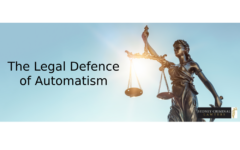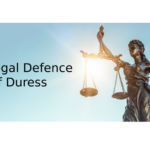The Legal Defence of Automatism in New South Wales

Last year, Brendon Paul Lidgard was found not-guilty of one count of dangerous driving occasioning death and three counts of dangerous driving occasioning grievous bodily harm inn the NSW District Court. The charges arose after Lidgard overdosed on his insulin medication for his type 1 diabetes and dangerously drove his truck resulting in the death of a woman and the injury of three others.
Lidgard was found not-guilty on the basis that his insulin overdose provoked a state of hypoglycemia (low blood sugar), meaning that he could not voluntarily control his actions behind the wheel.
This type of argument is based on the quasi-defence of ‘automatism’ which states a person will not be held criminal responsible for involuntary actions.
Here’s what you need to know.
The element of voluntariness and quasi-defence of automatism
A state of ‘automatism’ occurs when a person commits an offence without having control or direction over what is being done.
Criminal responsibility does not attach to most offences unless the criminal acts undertaken are done so ‘voluntary’. Because of this, arguments regarding automatism are about proving an element of an offence (like ‘intention’ or ‘causing death’) as opposed to a formal legal defence (like duress or self-defence).
Automatism will be established if the accused’s actions were involuntary and unintentional.
To be voluntary, an act must be performed with the consciousness of the nature of the act and in exercise of a choice to do an act of that nature: Ryan v The Queen (1967) 121 CLR 205.
An act is presumed to be voluntary unless a case for automatism is raised by the defence to the standard of ‘reasonable possibility’ (R v Falconer (1990) 171 CLR 30). Once raised, the prosecution must disprove automatism to the standard of beyond reasonable doubt.
Crucially, the principles automatism can be further broken down into ‘sane’ and ‘insane’ automatism which have important consequences for the defendants who raise the quasi-defence.
Sane automatism
‘Sane’ automatism refers to states of automatism that are brought about by factors other than an infirmity of the mind (usually a mental or cognitive impairment).
Sane automatism is sometimes said to refer to states of automatism caused by ‘external’ factors as opposed to ‘internal’ factors of a person. Some examples include: concussion, drug-induced psychosis, transient disassociation due to emotional trauma and of course, hypoglycemia as a result of insulin medication (as in Lidgard).
However, this notion of ‘external’ causes is not always straightforward. For example, both sleepwalking (R v Tolson) and epilepsy (R v Youssef) have been found to be forms of sane automatism, despite being clearly linked to individual physiology.
Some distinctions made regarding sane and insane automatism can also appear rather arbitrary. For example, as already noted, hypoglycemia (low blood sugar) as a result of insulin medication can constitute in a successful argument of sane automatism, however hyperglycemia (high blood sugar) as a result of not taking medication will not (R v Hennessy).
If successfully raised, the quasi-defence of sane automatism would result in an element of the offence failing to be proven and result in an acquittal.
Insane automatism
If the cause of automatism is said to originate from an infirmity of the mind the condition of ‘insane automatism’ will be raised and the defendant’s case becomes one of establishing an insanity defence. Under section 28(1) of the the Mental Health and Cognitive Impairment Forensic Provisions Act 2020 a person is not criminally responsible for an offence if:
…at the time of carrying out the act constituting the offence, the person had a mental health impairment or a cognitive impairment, or both, that had the effect that the person –
(a) did not know the nature and quality of the act, or
(b) did not know that the act was wrong (that is, the person could not reason with a moderate degree of sense and composure about whether the act, as perceived by reasonable people, was wrong).
This defence must be proven by the accused to the standard of ‘on the balance of probabilities’ in order to result in an acquittal.
What constitutes a ‘mental health impairment’ is outlined under section 4 of the Act requiring that:
- the person has a temporary or ongoing disturbance of thought, mood, volition, perception or memory, and
- the disturbance would be regarded as significant for clinical diagnostic purposes, and
- the disturbance impairs the emotional wellbeing, judgment, or behaviour of the person.
A list of clinically relevant mental disorders is listed under the Act and includes mood disorders and psychotic disorders, but not drug intoxication or addiction.
Section 5 of the Act defines cognitive impairment, requiring that:
- the person has an ongoing impairment in adaptive functioning, and
- the person has an ongoing impairment in comprehension, reason, judgment, learning or memory, and
- the impairments result from damage to or dysfunction, developmental delay, or deterioration of the person’s brain or mind.
A list of conditions which result in cognitive impairment is also provided in the Act encompassing intellectual disabilities, dementia, acquired brain injuries and autism spectrum disorder.
Unlike sane automatism, establishing insane automatism (and therefore a defence of mental health impairment or cognitive impairment) would result in a person being dealt with under the provisions of the Mental Health Act 2007 (NSW), which may involve involuntary detention in a mental health facility.
Finally, if the case against the accused is one of murder further possibilities arise. For example, under section 23A of the Crimes Act 1900 states that a person who would otherwise be guilty of murder could be convicted of manslaughter if:
- at the time of the acts or omissions causing the death concerned, the person’s capacity to understand events, or to judge whether the person’s actions were right or wrong, or to control himself or herself, was substantially impaired by a mental health impairment or a cognitive impairment, and
- the impairment was so substantial as to warrant liability for murder being reduced to manslaughter.
Going to court for a criminal matter?
If you are going to court over a criminal case, call Sydney Criminal Lawyers anytime on 9261 8881 to arrange a free first conference during which one of our experienced defence lawyers will assess the case, advise you of your options and the best way forward, and fight for the optimal outcome.






